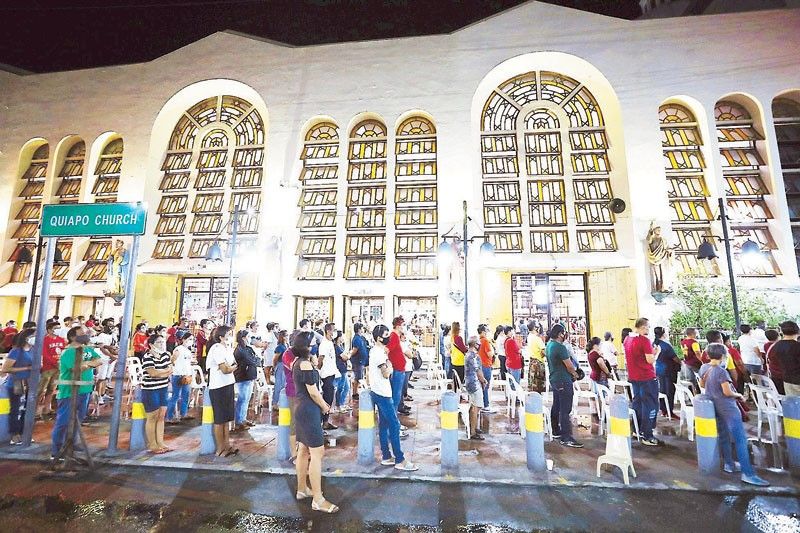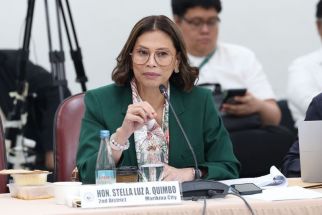Manila cancels Nazarene Traslacion

MANILA, Philippines — Manila Mayor Isko Moreno and the Catholic Church have agreed that there will be no Traslacion of the Black Nazarene on Jan. 9 next year as the city continues to struggle with the coronavirus pandemic.
“If the situation of Manila today is the same in January, it’s a no-no. I’m very sorry but I cannot put millions of people at risk. In fairness to them (Catholic Church), they agreed already,” Moreno told “The Chiefs” on One News/TV5 on Thursday night, seeking the understanding of devotees. “God will understand.”
Prior to his appearance on the program, Moreno met with representatives of Quiapo Church, who agreed to cancel the procession for the first time to ensure that public health protocols will be implemented on the day of the annual Traslacion or procession during the Feast of the Black Nazarene.
He said there are other suggestions, some of which will adopt technology, which “they will have to agree upon.”
“One thing is certain, no parade, no throngs. There is no point to go to Quiapo on the said day because the Nazarene will not be brought out,” Moreno added.
He said the Church will bring “the Nazareno closer to their home by using technology.”
However, Moreno said the next challenge is whether people would still go to Quiapo despite the absence of the procession.
“We experienced it on the first Friday of October. There was an overflow of people. What more if it’s the Nazarene?” he said.
Every year, millions of barefoot devotees line up to join the procession of the image of the Black Nazarene from the Quirino Grandstand in Rizal Park to the Quiapo Church, with the belief that the life-sized image has miraculous powers.
Moreno said that public health protocols must prevail over religious traditions, stressing that the COVID-19 pandemic remains a threat to the nation’s capital.
Moreno also laid down all the city government’s programs in their fight against COVID-19, including their completion of blended learning requirements and the swab testing on the men on the street.
Quiapo Church officials could not do anything, but welcomed the decision of the Manila city government to suspend the Traslacion of the Black Nazarene next year as the country continues to struggle with the pandemic.
Fr. Douglas Badong, parochial vicar of the Quiapo Church, said that the church understands the decision of the city government, but he said they are now thinking of alternative activities during the Feast of the Black Nazarene.
The approval for the alternative activities will be known by November.
Badong said that only the Traslacion or procession was suspended by the city government, not all the activities related to the feast of the Nazarene.
“To the devotees, widen your understanding in this situation. The celebration of the Feast of the Black Nazarene will push through, but not like the traditional events, hope the devotees understand,” he said.
Monsignor Hernando Coronel, rector of Quiapo Church, echoed Badong’s sentiments, saying that they would abide with the decision of the city government as they are thinking of coming up with alternatives.
Coronel said they are considering the proposal to bring masses for the Feast of the Black Nazarene closer to the people to ensure that they will not feel deprived of their religious freedom amid the pandemic.
He explained that the synchronized masses aim to decentralize the celebration of the Feast of the Black Nazarene.
Church capacity
In the spirit of Christmas, the Inter-Agency Task Force for the Management of Emerging Infectious Diseases (IATF) has allowed the increase to 30 percent of the venue or seating capacity inside churches by December.
Presidential spokesman Harry Roque Jr. revealed yesterday that Metro Manila mayors have also agreed to adjust the curfew by December from midnight to 3 a.m. to allow churchgoers to hear pre-dawn masses.
Roque said the IATF and the mayors made the decision after statistics showed a decline in COVID-19 infection and more recoveries in the past weeks.
Metro Manila, however, remains under general community quarantine (GCQ).
Various religious groups are advised to strictly adhere to minimum health standards at all times.
The IATF has given consideration to allow more people to practice their faith, which would also mean allowing more churchgoers to attend pre-dawn masses in the run-up to Christmas Day.
The IATF ruled earlier that cemeteries will be closed from Oct. 29 to Nov. 4 to avoid the influx of thousands who observe the annual All Souls’ Day and All Saints’ Day tradition.
The public was advised to go to cemeteries on earlier dates to avoid crowds.
The Catholic Church will make the necessary adjustments in compliance with the guidelines of the IATF for religious gatherings in the new normal.
Fr. Jerome Secillano, secretary general of the Catholic Bishops’ Conference of the Philippines (CBCP) for public affairs committee, told The Chiefs on One News that they would adjust the time for religious gatherings and the allowed capacity for churchgoers.
Secillano said they will particularly make the necessary adjustments for the schedule of this year’s Simbang Gabi or pre-dawn masses to adhere to the midnight to 3 a.m. curfew.
They will also comply with the allowed 30 percent capacity for churchgoers.
For Simbang Gabi, he said there can be an anticipated mass at 7 and 9 p.m. to beat the curfew and dawn masses reset from 3 a.m. to 5 a.m. to accommodate more churchgoers.
Secillano said they will seek the help of barangay officials and police officers in implementing physical distancing and the mandatory wearing of face masks and face shields outside the church. - Christina Mendez, Robertzon Ramirez
- Latest
- Trending




























